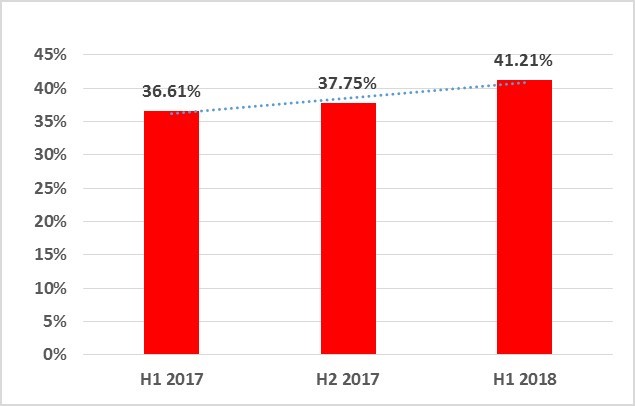More than 40% of all industrial control system (ICS) computers protected by Kaspersky Lab solutions were attacked by malicious software at least once during the first half of 2018. The most impacted countries turned out to be Vietnam, Algeria and Morocco, while the safest region for industrial machines was Denmark. These are among the main findings of the Kaspersky Lab ICS CERT report on the industrial threat landscape in H1 2018.
Cyberattacks on industrial computers are considered to be an extremely dangerous threat as they cause material losses and production downtime for a whole system. Moreover, industrial enterprises knocked out of service can seriously undermine a region’s social welfare, ecology and macroeconomics.
Statistics collected by Kaspersky Lab researchers show that this kind of threat is of growing concern. In the first half of 2018, 41.2% of ICS computers were attacked at least once. Moreover, this is a continuation of a trend: in 2017, the figure increased from 36.61% in the first half of the year to 37.75% in the second half.
 Percentage of ICS computers attacked (H1 2017 – H1 2018)
Percentage of ICS computers attacked (H1 2017 – H1 2018)
Top countries by the number of ICS computers attacked in 2018 were Vietnam, where 75.1% of ICS computers were attacked, Algeria, with 71.6% and Morocco with 64,8%. As for the least attacked industrial facilities, the top three countries turned out to be Denmark with 14% attacked computers in industrial enterprises, followed by Ireland with 14.4% and Switzerland close behind, accounting for 15.9%. Developing economies account for highest numbers of ICS computers attacked, while developed regions have the lowest number of targeted ICS computers.
The largest number of threats come from the internet, which over the years has become the main source of infection for ICS: 27% of threats are received from the world wide web; while removable storage media is ranked second with 8.4%. Mail clients occupy third place in terms of volume– they represent 3.8% of threats.
“The percentage of cyberattacks on ICS computers is a concern. Our advice is to pay attention to systems’ security from the very beginning of their integration, when the systems’ elements are first connected to the internet: neglecting security solutions at this stage could lead to dire consequences.” - says Kirill Kruglov, security researcher at Kaspersky Lab.
Kaspersky Lab ICS CERT recommends implementing the following technical measures:
- Regularly update operating systems, application software and security solutions on systems that are part of the enterprise’s industrial network.
- Restrict network traffic on ports and protocols used on edge routers and inside the organization's OT networks.
- Audit access control for ICS components in the enterprise’s industrial network and at its boundaries.
- Deploy dedicated endpoint protection solutions on ICS servers, workstations and HMIs to secure OT and industrial infrastructure from random cyberattacks; and network traffic monitoring, analysis and detection solutions for better protection from targeted attacks.
- Provide dedicated training and support for employees as well as partners and suppliers with access to your network.
Read the full report for H1 2018 on the Kaspersky Lab ICS CERT website.
About Kaspersky Lab
Kaspersky Lab is a global cybersecurity company, which has been operating in the market for over 20 years. Kaspersky Lab’s deep threat intelligence and security expertise is constantly transforming into next generation security solutions and services to protect businesses, critical infrastructure, governments and consumers around the globe. The company’s comprehensive security portfolio includes leading endpoint protection and a number of specialized security solutions and services to fight sophisticated and evolving digital threats. Over 400 million users are protected by Kaspersky Lab technologies and we help 270,000 corporate clients protect what matters most to them.
Learn more at kaspersky.com
About Kaspersky Lab ICS CERT
Kaspersky Lab Industrial Control Systems Cyber Emergency Response Team (Kaspersky Lab ICS CERT) is a global project launched by Kaspersky Lab in 2016 to coordinate the efforts of automation system vendors, industrial facility owners and operators, and IT security researchers to protect industrial enterprises from cyberattacks. Kaspersky Lab ICS CERT devotes its efforts primarily to identifying potential and existing threats that target industrial automation systems and the Industrial Internet of Things. During its first year of operation, the team identified over 110 critical vulnerabilities in products by major global ICS vendors. Kaspersky Lab ICS CERT is an active member and partner of leading international organizations that develop recommendations on protecting industrial enterprises from cyberthreats. ics-cert.kaspersky.com
More than 40% of ICS computers were attacked in H1 2018
Kaspersky
Related Articles Press Releases
Kaspersky identifies BlindEagle’s new spy plugin
The BlindEagle APT (Advanced Persistent Threat) group has introduced several updates in one of their latest espionage campaigns targeting individuals and organizations from Colombia, the Kaspersky Global Research and Analysis team (GReAT) has reported. The updates include a new espionage plugin and the use of legitimate Brazilian file-hosting sites during the infection process. The group is increasingly leaving artifacts in Portuguese in their malicious code, whereas previously, they predominantly used Spanish. Kaspersky also observed BlindEagle launching a separate campaign that employs the DLL sideloading technique, uncharacteristic of the actor.Read More >Kaspersky discovers 'Tusk,' active information and crypto stealing campaign
Kaspersky has detected an online fraud campaign aimed at stealing cryptocurrency and sensitive information by exploiting popular topics such as web3, crypto, AI, online gaming, and beyond. Targeting individuals worldwide, the campaign is believed to be orchestrated by Russian-speaking cybercriminals and spreads info-stealing and clipper malware.Read More >Surprising digital privacy contradictions: 49% of users cover webcams, 40% rely on Incognito mode
A new study by Kaspersky has shed light on key digital myths and superstitions and consumers' attitudes towards themRead More >
We use cookies to make your experience of our websites better. By using and further navigating this website you accept this. Detailed information about the use of cookies on this website is available by clicking on more information.